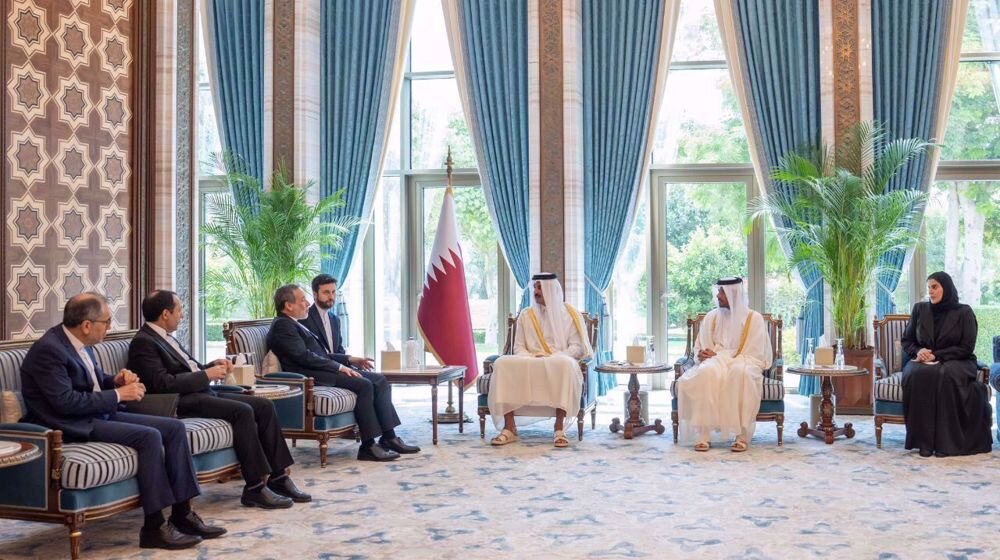‘Misunderstanding fully resolved’, Iran reaffirms ties with Qatar

TEHRAN – Iran and Qatar have resolved a recent diplomatic misunderstanding following high-level discussions in Doha, Iranian Foreign Minister Abbas Araghchi announced on Friday.
The issue had arisen after Iran conducted strikes on Qatar’s Al-Udeid base in response to a U.S. attack on Iranian nuclear facilities, prompting tensions between the two Persian Gulf neighbors.
Speaking in an interview with Al-Sharq newspaper, Araghchi described the outcome of his meetings with Qatari officials as “very important and influential,” noting that he conveyed a message from Iranian President Masoud Pezeshkian to Sheikh Tamim bin Hamad Al Thani, the Emir of Qatar. “There are no differences between the two countries, and the misunderstanding that had arisen has been fully resolved through this visit,” Araghchi said.
FM Araghchi hails discussions with Qatari PM as ‘highly productive’
The Iranian diplomat also met with Sheikh Mohammed bin Abdulrahman Al Thani, Qatar’s Prime Minister and Foreign Minister, describing the discussions as “serious, constructive, and highly productive.” Araghchi emphasized that the talks provided a platform to strengthen bilateral ties and explore opportunities for regional cooperation, particularly in the areas of security and stability.
The Iranian foreign minister highlighted that discussions with Qatar extended beyond the immediate misunderstanding, covering a broad spectrum of issues, including bilateral relations and the latest regional developments. He underlined the importance of enhancing cooperation among neighboring countries to ensure regional stability and security.
“In our talks, we explored ways to revive dialogue among regional nations and to coordinate efforts in countering the hegemonic ambitions and aggressive policies of the Israeli regime,” Araghchi said. He also noted that the Iranian nuclear program was discussed in detail, with the Emir of Qatar receiving updates on the latest developments. “Our Qatari friends have always held constructive views, and these consultations provided valuable insights for both sides,” he added.
A central focus of Araghchi’s meetings was the ongoing crisis in Gaza and the broader Israeli–Palestinian conflict. The discussions highlighted the continuation of Israel’s attacks on Gaza, which have resulted in civilian casualties and widespread humanitarian suffering.
Both sides called for urgent action by regional states and the international community to halt what Araghchi described as “genocide and crimes committed by the Zionist regime in occupied Palestine.” He emphasized the necessity of prosecuting those responsible, providing immediate humanitarian aid to affected populations, and confronting Israel’s broader policies of aggression and domination in the region.
Araghchi praised the “legendary resilience” of the Palestinian people, affirming Iran’s principled support for their legitimate resistance against occupation. He reiterated Tehran’s commitment to stand by the Palestinian nation until its rights are fully restored, describing the ongoing atrocities, including imposed famine and attacks on civilians, as evidence of a genocidal campaign.
‘Iran remains steadfast on diplomacy in nuclear talks with EU’
In addition to his meetings with Qatari leaders, Araghchi met with Kaja Kallas, the European Union’s High Representative for Foreign Affairs and Security Policy. The discussions focused on recent developments surrounding Iran’s nuclear program, particularly the controversial move by Britain, France, and Germany to reinstate previously annulled UN Security Council resolutions.
Araghchi condemned the European trio’s action as “illegal and unjustified,” stressing the responsibility of the EU in its capacity as coordinator of the JCPOA Joint Commission under UN Security Council Resolution 2231. He called on the EU to support diplomatic channels and prevent actions that could undermine ongoing negotiations.
Reaffirming Iran’s steadfast commitment to diplomacy, Araghchi stated that Tehran remains serious and unwavering in pursuing dialogue to address international concerns.
Kallas, in turn, emphasized that diplomacy and negotiations remain the only viable path forward and urged that all parties provide additional time and space for constructive talks. Both sides agreed to continue consultations in the coming weeks to maintain momentum in resolving nuclear-related disputes.
Palestinian determination to resist remains unshaken, Araghchi tells Hamas leaders
During his visit, Araghchi also held a meeting with senior Hamas officials, including Khalil al-Hayya, a member of the movement’s Political Bureau, along with other members of the leadership council. Discussions centered on the evolving situation in Gaza, the continuation of Israeli attacks, and efforts to facilitate prisoner exchanges.
Araghchi praised the “heroic resilience” of the Palestinian population in Gaza and the West Bank, reiterating Iran’s support for their legitimate resistance. He highlighted the growing wave of international protests against Israeli atrocities as evidence of global awareness and solidarity with the Palestinian cause.
He called for urgent, coordinated action by Muslim nations to stop ongoing violence, deliver humanitarian aid to the besieged population, and ensure accountability for those responsible. Araghchi further stressed that continued cooperation among Islamic countries is essential to end the siege of Gaza and counter Israel’s destabilizing actions in the region.
Khalil al-Hayya provided a detailed briefing on the situation on the ground in Gaza, praising Iran’s support for the Palestinian people and acknowledging solidarity from regional and international allies, particularly the people of Yemen. He stressed that despite Israel’s repeated atrocities, the determination of the Palestinian people to resist and defend their legitimate rights remains unshaken.
Leave a Comment